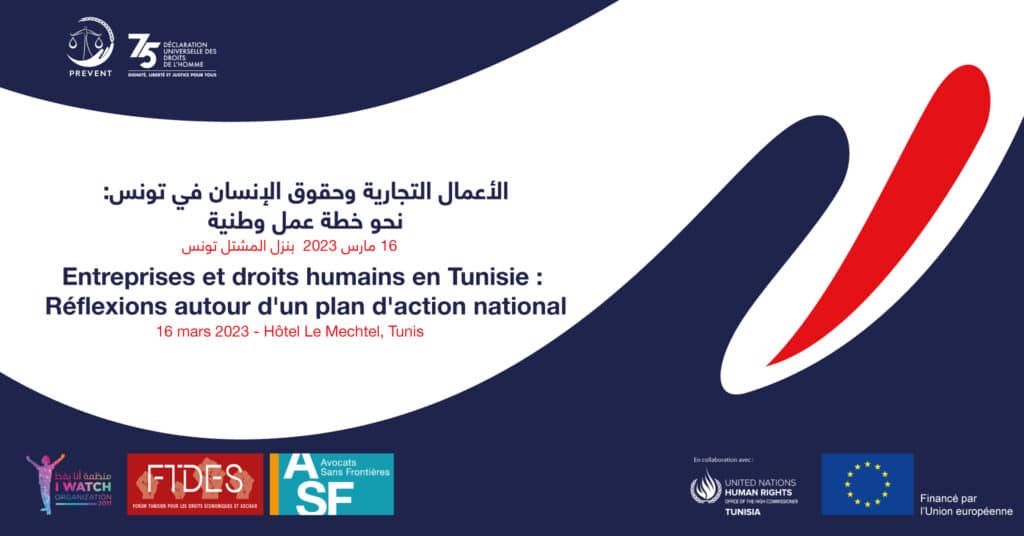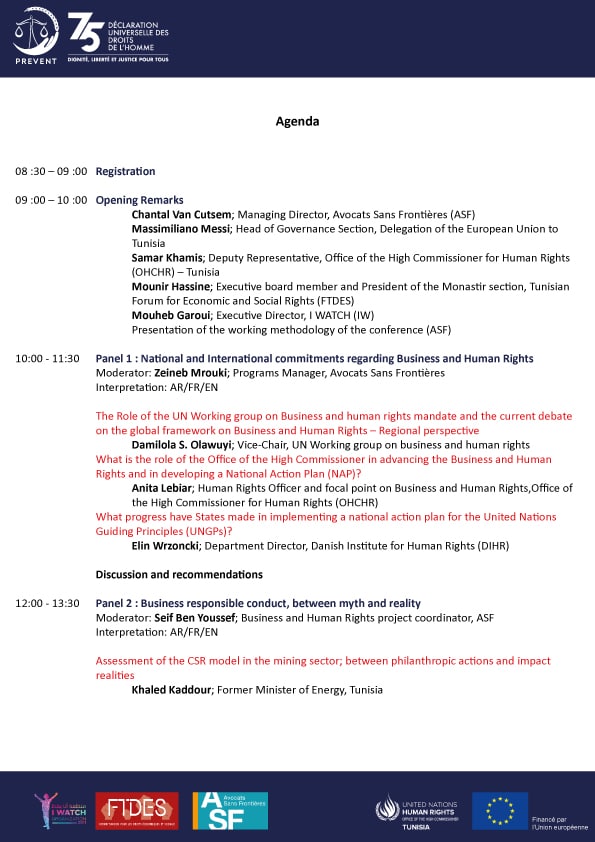
Business and Human Rights in Tunisia : Reflexions on a national action plan
- International event organized at the Mechtel hotel in Tunis, on March 16, 2023
- Plenary sessions and separate brainstorming workshops
- This international conference is organized by PREVENT, a project implemented by Avocats Sans Frontières (ASF), the Tunisian Forum for Economic and Social Rights (FTDES) and IWATCH (IW), in collaboration with The Office of the High Commissioner for Human Rights (OHCHR), and with the support of the European Union EU.
- The plenary sessions of the conference will be broadcast live on the Facebook account of Avocats sans Frontières in Tunisia
Context and introduction:
After years of debate, the statement “businesses must respect human rights” now unites almost all governments, businesses, and civil society organizations worldwide. In 2011, consensus was reached through the United Nations Human Rights Council’s adoption of the UN Guiding Principles on Business and Human Rights.
While recognizing the progress that economic activities allow, many experts (including those at the United Nations, World Bank, and IMF) note that economic growth does not alleviate poverty in the world; rather it generates further social inequalities and regularly causes major environmental damage.
This international framework acknowledges the urgent need to respond to the disruptions and injustices caused by economic globalization and the limitations of voluntary approaches proposed by Corporate Social Responsibility (CSR) standards in preventing possible violations. It imposes clear obligations on states and companies (national, multinational, and transnational) to protect and respect human rights and remedy in cases of business-related human rights abuse.
Tunisia is not immune to these tragedies nor to the demands of the people who suffer them.
Therefore, international human rights law and the UN Guiding Principles grant the Tunisian government both legal and political legitimacy to prevent business-related human rights abuses against its citizens and to build a sustainable future.
At the 11th Annual Forum on Business and Human Rights, Tunisia pledged to discuss and adopt its national action plan for implementing the UN Guiding Principles on Business and Human Rights.
The International Conference on “Business and human rights”:
The International Conference on Business and Human Rights aims to underscore the importance of Tunisia’s compliance with international instruments, such as the UN Guiding Principles on Business and Human Rights. In an inclusive approach, the conference seeks to create a platform for dialogue between various stakeholders to promote a shared understanding of the concept of Corporate Social Responsibility (CSR) and reflect on the national action plan proposed by the Tunisian government.
Specifically, the conference aims to:
- Bring together political representatives from national, regional, and international institutions, civil society, and businesses to analyze the challenges Tunisia faces in promoting human rights in the context of business.
- Formulate recommendations for prioritizing a national action plan aimed at implementing the UN Guiding Principles on Business and Human Rights.
- Create synergy among different civil society actors, social actors, employers, and justice actors.
- Advocate for the advancement of the debate on corporate responsibility and its impacts in Tunisia.
The Methodology of the conference:
The conference will consist of four plenary sessions, with the aim of debating its theme and coming up with conclusions / recommendations. The discussions will be summarized by rapporteurs and subsequently presented in the closing plenary.
Organizers:
This international conference is organized by PREVENT, a project implemented by Avocats Sans Frontières (ASF), the Tunisian Forum for Economic and Social Rights (FTDES) and IWATCH (IW), in collaboration with the United Nations Commissioner for Human Rights UNHCHR, and with the support of the European Union EU
Languages:
Arabic, French and English with simultaneous interpretation.
Agenda


